
Nauka i Tehnologii Truboprovodnogo Transporta Nefti i Nefteproduktov-Science & Technologies-Oil and Oil Products Pipeline Transportation
Scope & Guideline
Transforming Ideas into Solutions for Pipeline Challenges
Introduction
Aims and Scopes
- Pipeline Integrity and Reliability:
Research dedicated to assessing and enhancing the integrity and reliability of oil pipelines, including studies on corrosion, mechanical properties, and defect detection methodologies. - Pumping and Flow Dynamics:
Exploration of fluid dynamics in pipeline systems, including flow rate determination, turbulence effects, and pump design innovations to improve efficiency. - Environmental Impact and Safety:
Investigation into the environmental risks associated with pipeline operations and methodologies for mitigating these risks, including studies on spill prevention and response. - Materials and Coatings:
Focus on the development and testing of materials and coatings that can withstand harsh operating conditions while preventing corrosion and ensuring longevity of pipeline infrastructure. - Technological Innovations:
Research on the application of new technologies, including computer modeling, automation, and non-destructive testing techniques to enhance pipeline monitoring and maintenance. - Regulatory and Economic Aspects:
Analysis of the regulatory frameworks governing pipeline operations and the economic implications of technology adoption in the oil and gas sector.
Trending and Emerging
- Smart Technologies and Automation:
A significant trend towards the integration of smart technologies and automation in pipeline systems, including the use of AI and machine learning for predictive maintenance and operational efficiency. - Sustainability and Environmental Management:
Increased focus on sustainability practices, including the assessment of environmental impacts and the development of strategies for reducing carbon footprints in pipeline operations. - Advanced Materials for Pipeline Construction:
Emerging research into innovative materials such as composites and advanced coatings that enhance the durability and performance of pipelines under extreme conditions. - Risk Management and Safety Protocols:
Growing interest in comprehensive risk management strategies and safety protocols that address potential hazards in pipeline transportation, including the effects of climate change. - Hydrogen and Alternative Fuels Transportation:
An emerging theme centered around the transportation of hydrogen and other alternative fuels through existing pipeline infrastructures, reflecting the industry's shift towards greener energy solutions.
Declining or Waning
- Traditional Pipeline Construction Techniques:
Research focusing on conventional methods of pipeline construction appears to be declining, as more emphasis is placed on innovative technologies and methods that enhance efficiency and minimize environmental impact. - Low-Technology Solutions for Leak Detection:
Older, less sophisticated leak detection technologies are being overshadowed by advancements in smart technologies and automated systems, leading to a decline in publications related to traditional leak detection methods. - Non-Integrated Monitoring Systems:
The focus on isolated monitoring systems is decreasing, giving way to integrated and intelligent monitoring solutions that provide real-time data and analytics for pipeline management.
Similar Journals
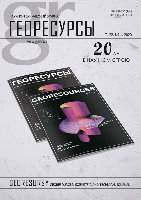
Georesursy
Unlocking the Secrets of Our Planet's ResourcesGeoresursy is a leading open access journal published by LTD GEORESURSY, serving as a vital platform for the dissemination of research in the fields of Geology and Geophysics. Operating from the Russian Federation, the journal has maintained its open access status since 2000, promoting global scholarship and accessibility to researchers, professionals, and students alike. With an ISSN of 1608-5043 and an E-ISSN of 1608-5078, Georesursy has established itself as a reputable source, currently holding a Q2 ranking in both the categories of Geology and Geophysics in 2023. This journal is indexed in Scopus, ranking #103 out of 165 and #201 out of 321 in Earth and Planetary Sciences for Geophysics and Geology, respectively. The impressive impact of the journal is underscored by its convergence years from 2017 to 2024, illustrating its commitment to advancing geological and geophysical research. We encourage contributions that reflect innovative methodologies, critical analysis, and interdisciplinary approaches essential for the progress of earth sciences.

SPE Production & Operations
Shaping the Evolution of Production PracticesSPE Production & Operations is a prestigious journal published by the Society of Petroleum Engineers (SPE), focusing on the critical domains of energy engineering and fuel technology. With an ISSN of 1930-1855 and an E-ISSN of 1930-1863, this journal has established itself as a vital resource in understanding the intricacies of production and operational practices within the petroleum sector. Its impressive Q2 ranking in both Energy Engineering and Power Technology, and Fuel Technology reflects its commitment to providing high-quality, impactful research. Spanning years from 2006 to 2023, SPE Production & Operations maintains an open access policy that ensures widespread dissemination of research findings, promoting knowledge sharing among industry professionals, researchers, and students alike. As the energy landscape continues to evolve, this journal serves as an essential platform for innovative research and discussion that addresses contemporary challenges and advancements in the field.
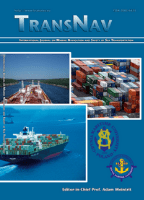
TransNav-International Journal on Marine Navigation and Safety of Sea Transportation
Sailing Towards Safer and Sustainable Seas.TransNav - International Journal on Marine Navigation and Safety of Sea Transportation is a leading scholarly publication that addresses the critical themes of marine navigation and maritime safety. Published by Gdynia Maritime University in Poland, this open-access journal has been a vital resource since its inception in 2007, fostering a global dialogue among researchers, maritime professionals, and students. With an impressive trajectory of convergence from 2019 to 2024, TransNav is recognized for its impact in the realm of Ocean Engineering, Oceanography, and Transportation, holding a notable Q3 ranking in Ocean Engineering and Q4 rankings in both Oceanography and Transportation for 2023. The journal serves as an essential platform for disseminating research findings and advancements that enhance safety protocols and navigation strategies in sea transportation, thus contributing to the sustainability and efficiency of maritime operations worldwide. Researchers can access its wealth of information through various academic databases, ensuring that your work remains on the cutting edge of this vital field.
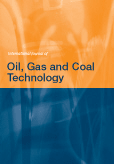
International Journal of Oil Gas and Coal Technology
Unleashing Insights in Oil, Gas, and Coal TechnologiesWelcome to the International Journal of Oil Gas and Coal Technology, a key platform for research and innovation in the energy sector, published by INDERSCIENCE ENTERPRISES LTD. With an ISSN of 1753-3309 and an E-ISSN of 1753-3317, this journal has been serving the academic community since its inception in 2008, continuing through to 2024. Located in the heart of Geneva, Switzerland, this journal focuses on the essential fields of oil, gas, and coal technologies, addressing cutting-edge developments and challenges in energy production and sustainability. Although currently categorized in the fourth quartile in Energy (Miscellaneous) and holding a Scopus rank in the 26th percentile, the journal aims to enhance its visibility and impact through rigorous peer-reviewed research articles, critical reviews, and insightful case studies that are accessible to the global academic community. Researchers, professionals, and students alike will find valuable insights and advancements in energy technology that contribute to a sustainable future.

SPE RESERVOIR EVALUATION & ENGINEERING
Advancing Reservoir Insights for a Sustainable FutureSPE RESERVOIR EVALUATION & ENGINEERING, published by the Society of Petroleum Engineers, is a leading academic journal that plays a pivotal role in the fields of energy engineering and geology. With a notable Q2 ranking in Energy Engineering, Fuel Technology, and Energy (Miscellaneous), as well as a Q1 ranking in Geology, this journal is recognized for its high-quality, peer-reviewed research contributions that enhance our understanding of reservoir evaluation and engineering practices. Since its inception in 1999, the journal has aimed to disseminate innovative techniques and methodologies applicable to both academia and industry. Available in both print (ISSN: 1094-6470) and online (E-ISSN: 1930-0212) formats, it ensures wide accessibility to its content even as it embraces Open Access options for select titles. Researchers, professionals, and students alike can benefit from the rich repository of technical papers, case studies, and reviews, all designed to advance knowledge and applications in the ever-evolving energy sector.
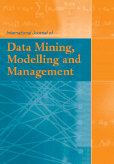
International Journal of Data Mining Modelling and Management
Empowering Researchers with Cutting-Edge Data InsightsInternational Journal of Data Mining Modelling and Management, published by InderScience Enterprises Ltd, is a prominent academic platform dedicated to the exploration and advancement of data mining techniques and their applications across various domains. Located in the picturesque environment of Geneva, Switzerland, this journal serves as a crucial resource for researchers, professionals, and students engaged in the fields of Computer Science, Management Information Systems, and Modeling and Simulation. With an ISSN of 1759-1163 and an E-ISSN of 1759-1171, the journal has steadily converged its scope from 2008 to 2024, emphasizing innovative methodologies and dynamic developments in data analytics. Although currently categorized in Q4 for several relevant fields according to 2023 quartiles, the journal is committed to elevating its impact and outreach through rigorous peer-reviewed research, making it an essential read for those aiming to stay at the forefront of data-driven decision-making and management practices. Whether you are a seasoned researcher or an eager student, the International Journal of Data Mining Modelling and Management offers invaluable insights and contributions to the evolving conversation in data science.
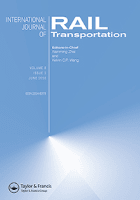
International Journal of Rail Transportation
Elevating standards in automotive and rail mechanics.International Journal of Rail Transportation is a premier academic publication dedicated to advancing the field of rail transportation, published by Taylor & Francis Ltd. With an impressive convergence of scholarly contributions from 2013 to 2024, the journal aims to disseminate high-quality research and innovative ideas in automotive engineering, mechanics of materials, and transportation. The journal proudly holds a Q1 ranking in both Automotive Engineering and Mechanics of Materials for 2023, as well as a Q2 ranking in Transportation, signifying its impact and relevance in the respective disciplines. Additionally, it is recognized within the top percentiles in its Scopus rankings, affirming its commitment to producing significant insights that inform both academic and industrial practices. While currently not open access, the journal strives to connect researchers, professionals, and students with cutting-edge developments in rail transportation. By fostering collaboration and knowledge sharing, the *International Journal of Rail Transportation* serves as an essential resource for those seeking to push the boundaries of transport engineering and contribute to sustainable infrastructure solutions.

Upstream Oil and Gas Technology
Uncovering Breakthroughs in Oil and Gas ExplorationUpstream Oil and Gas Technology, published by Elsevier, is a leading journal dedicated to advancing knowledge and innovation in the upstream oil and gas sector. With an ISSN of 2666-2604, this journal offers insightful research articles and critical reviews from 2019 to 2023, creating a valuable repository of knowledge for professionals and academics alike. Strategically positioned in the Q2 quartile of various related fields, including Chemical Engineering, Fuel Technology, and Geophysics, it holds impressive Scopus rankings, such as Rank #30 in Geophysics, demonstrating its significant impact within the scientific community. Although currently not operating under an open access model, the journal remains accessible through institutional subscriptions, ensuring that essential research is readily available to those in the industry. The editorial objectives focus on promoting high-quality research that addresses contemporary challenges in exploration, production, and sustainable practices within the upstream oil and gas domain, making it an invaluable resource for researchers, students, and industry professionals.

Journal of Oil Palm Research
Shaping the Future of Oil Palm through Research and CollaborationJournal of Oil Palm Research is a pivotal publication in the field of agricultural science, specifically focusing on the multifaceted aspects of oil palm cultivation, research advancements, and sustainability practices. Published by the MALAYSIAN PALM OIL BOARD, this journal serves as a significant platform for disseminating high-quality research and innovative solutions in oil palm agronomy, genetics, and socio-economic impacts, capturing the interest of researchers, industry professionals, and students alike. With an E-ISSN of 2811-4701, the journal is committed to presenting peer-reviewed articles that aim to enhance the understanding of oil palm's role in global agriculture and its contributions to environmental sustainability. The absence of a traditional access fee underscores its dedication to open access principles, fostering broader dissemination of knowledge. As the oil palm industry continues to evolve amidst environmental and market challenges, the Journal of Oil Palm Research remains essential for those dedicated to this field, offering insights that inform practice and policy.

China Petroleum Processing & Petrochemical Technology
Exploring breakthroughs in petroleum and petrochemical research.China Petroleum Processing & Petrochemical Technology is a critical journal published by the China Petroleum Processing & Petrochemical Technology Press, focusing on the pivotal advancements within the field of petroleum processing and petrochemical technology. With ISSN 1008-6234, the journal has been a significant resource since its inception in 1999 and aims to disseminate original research articles, reviews, and case studies that contribute to knowledge and innovation in energy engineering, fuel technology, and chemical engineering. Despite its current Q4 status in various quartile rankings, it provides essential insights and research that are invaluable for researchers, professionals, and students interested in these expanding areas. The journal is located in Beijing, China, and continues to strive for excellence in academia, encouraging contributions that address pressing challenges in the petroleum and petrochemical industries while fostering a deeper understanding of process chemistry and technology.